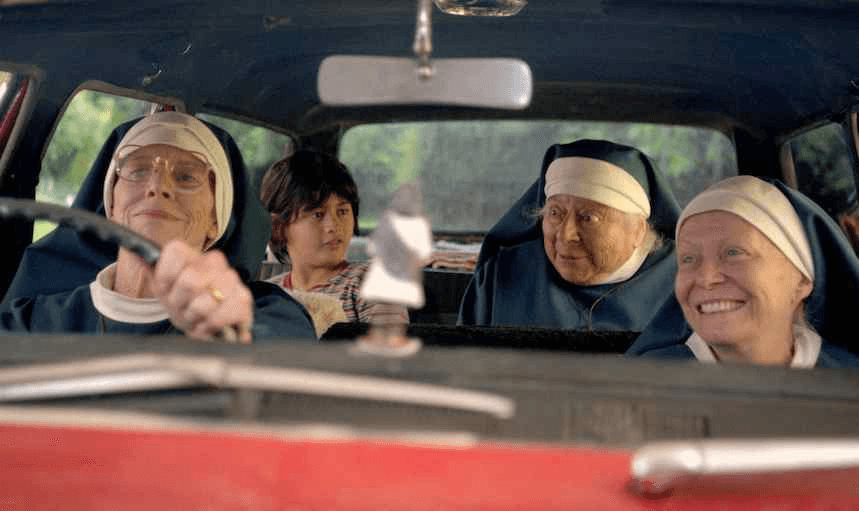Following the US president’s announcement of a 100% tariff on all films made ‘in foreign lands’, the local screen industry has been left concerned – if not slightly confused.
Donald Trump has announced that a 100% tariff will be put in place on all films made outside of the United States of America. “The Movie Industry in America is DYING a very fast death,” he posted on social network TruthSocial. “Other Countries are offering all sorts of incentives to draw our filmmakers and studios away from the United States. Hollywood, and many other areas within the U.S.A., are being devastated.”
Trump continued by saying that those filmmaking incentives, which would include the New Zealand Screen Production Grant, are “a national security threat” that also amount to “messaging and propaganda”. He then authorised the beginning of a process instituting a 100% tariff on “any and all Movies coming into our Country that are produced in Foreign Lands” concluding with this: “WE WANT MOVIES MADE IN AMERICA, AGAIN!”
The announcement has potentially huge implications for Aotearoa. Our gross screen sector revenue is around $3.5 billion per annum, and a significant portion of that is from overseas productions. Since 2014, the New Zealand Screen Production Rebate has provided up to a 25% rebate to international screen productions shooting in Aotearoa, and has been accessed by such blockbuster American titles as Avatar: The Way of Water, M3GAN and The Meg.
A report evaluating the impact of the grant in 2018 found a net economic benefit of $336.1 million in its first three years alone. By 2022, it was found that productions accessing the rebate spent an estimated $5.2 billion in New Zealand, including on local jobs, hospitality, building and construction. “This represents a significant investment into New Zealand’s economy and far outweighs the cost of the rebate,” reads the Ministry of Culture and Heritage website.
So where does Trump’s announcement leave all those US productions coming to our shores? Anne Murray, CEO of the New Zealand Film Commission, told The Spinoff that conversations were happening off the back of the announcement. “We’re in the process of speaking with our international partners about what the implications could be,” she said. “We’re mindful, however, this is an evolving situation and it’s too early to speculate on what this could mean.”
Irene Gardiner, president of Screen Producers NZ (SPADA), found the wording of the announcement “a little confusing”.
“He seems to be worried about US films being ‘shot/post produced’ in other countries, with the incentives that are offered,” she said. “But then he talks about movies ‘produced’ outside of the US being subjected to tariffs.” She offers a local example: “Does he mean NZ-produced movies like Tinā couldn’t be released in the US without a tariff? Or does he mean American-produced movies that are shot here will be targeted?”
Regardless of where the tariff is directed, Gardiner says it would be “a terrible shame” for the industry if implemented. Recent US productions on our shores include Heart of the Beast, a Brad Pitt film in Queenstown, and Florence Pugh’s East of Eden in Ōamaru. “We love having American productions working here – it’s great for the economy and it’s great for the screen industry. And we love our best NZ movies and stories being seen by American audiences.”
Local screen industry veteran John Barnett agrees that while there is concern out there, there’s also a lack of clarity about how the tariff process would be carried out. “Nobody knows whether it includes television content or streaming content, or at what point the tariff is actually going to take place,” he says. “What is Trump going to do if M3GAN comes here and spends $200 million here? Is he going to charge them $200 million? And who’s going to pay it?”
Nonetheless, Barnett understands why people would be feeling rattled. “Right now US productions are the biggest source of of continual production in New Zealand – East of Eden was here for eight months and employed hundreds of people, or Cameron’s Avatar films that had hundreds of people working for years,” he says. “Then there’s the post houses like Wētā FX who do a lot of finishing work – everybody will be trying to find out what that 100% means.”
At his post-cabinet press conference this afternoon, prime minister Christopher Luxon said that New Zealand was “the best place to make movies in the world” but it was “way too soon” to talk about whether the government would consider any changes to the screen rebate as a result of Trump’s announcement. Paul Goldsmith, minister for media and communications and minister for arts and heritage, did not reply to The Spinoff’s request for comment.
According to Trump’s social announcement, the process has already begun to implement the 100% tariff. While the screen industry in Aotearoa awaits further detail, Barnett gently adds another point to consider. “Not unlike everything else Trump has done, it is totally lacking in logic,” he says. “If there’s one thing we’ve learned in the first 100 days, is that what he says today isn’t necessarily what he’ll say tomorrow.”



